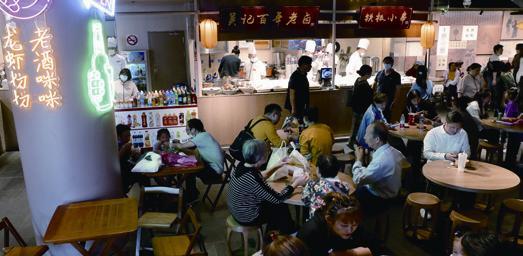New Consumption Trends Shine in Golden Week Holiday
2020-11-03

China has seen new consumption patterns during the eight-day Golden Week holiday as pent-up demand unleashed amid effective containment of the novel coronavirus disease (COVID-19).
From October 1 to 8, sales of key retail and catering firms monitored by the Ministry of Commerce (MOFCOM) totaled 1.6 trillion yuan($236 billion), with daily average sales climbing 4.9 percent compared with the National Day holiday last year, data from the ministry showed.
This years Golden Week was the fi rst long holiday after authorities lifted most of the domestic travel restrictions amid effective control of the epidemic, and was widely seen as a barometer of Chinas consumption vitality and growth potential.
As more people are getting accustomed to placing online orders for groceries, takeaways and other services, this years Golden Week featured more Internet-powered consumption.
In Mayang Miao Autonomous County of Hunan Province in central China, local agricultural products were marketed to the rest of the country via live-streaming, which helped the county rake in a revenue of 450,000 yuan($66,994) on a single day.
The Internet has changed the fl avor of traveling. During the holiday, more travel essentials, including personal care products and charging cables, were ordered online and delivered to hotels and scenic spots, a report by the Internet company Alibaba showed.
During the holiday, the Chinese spent more on high-end, expensive products. Sales of organic food, automobiles, smart home appliances and jewelry saw notable increases, MOFCOM data showed.
Duty-free consumption, meanwhile, gained momentum in Hainan Province in south China thanks to favorable policies.
Data from Haikou Customs on October 9 showed that Hainans four offshore duty-free shops received some 146,800 customers and sold 998,900 duty-free items during the holiday, with total sales jumping 148.7 percent year on year to reach 1.04 billion yuan ($155 million).
Starting on July 1, Hainan increased its annual tax-free shopping quota from 30,000 yuan($4,466) to 100,000 yuan ($14,887) per person. The range of duty-free goods has also expanded from 38 categories to 45, while the previous tax-free limit of 8,000 yuan ($1,191) for a single product has been lifted.
As peoples income continues to rise and the number of high-net-worth individuals increases, Chinas consumption will continue to upgrade, Guotai Junan Securities said in a research note.
The COVID-19 outbreak disrupted the past Chinese Lunar New Year, a time for family reunions. It, however, seemed that Chinese have taken advantage of the long October holiday to make up for the lost time.
Air tickets purchased by groups of three or more people soared compared with the Dragon Boat Festival holiday in late June, while more people turned to recreational vehicles for traveling. Besides, the recovery of the box offi ce was supported by family spending. Film tickets bought by groups of three or more accounted for a larger share of the box offi ce, the Alibaba report showed.
As people living in small towns in China are becoming more affluent, they are spending more on traveling. The Alibaba report said travelers from third-tier or smaller cities accounted for 60 percent of all travelers during the holiday, with their average spending rising 50 percent year on year.
More than 50 percent of the commercial electrical appliances such as popcorn poppers and sausage grill machines sold during the holiday fl owed to county-level markets, manifesting confidence of shop owners in the small-town economy, according to the report.
The trends indicate that Chinas small towns still have huge consumption potential, Guotai Junan Securities said.
